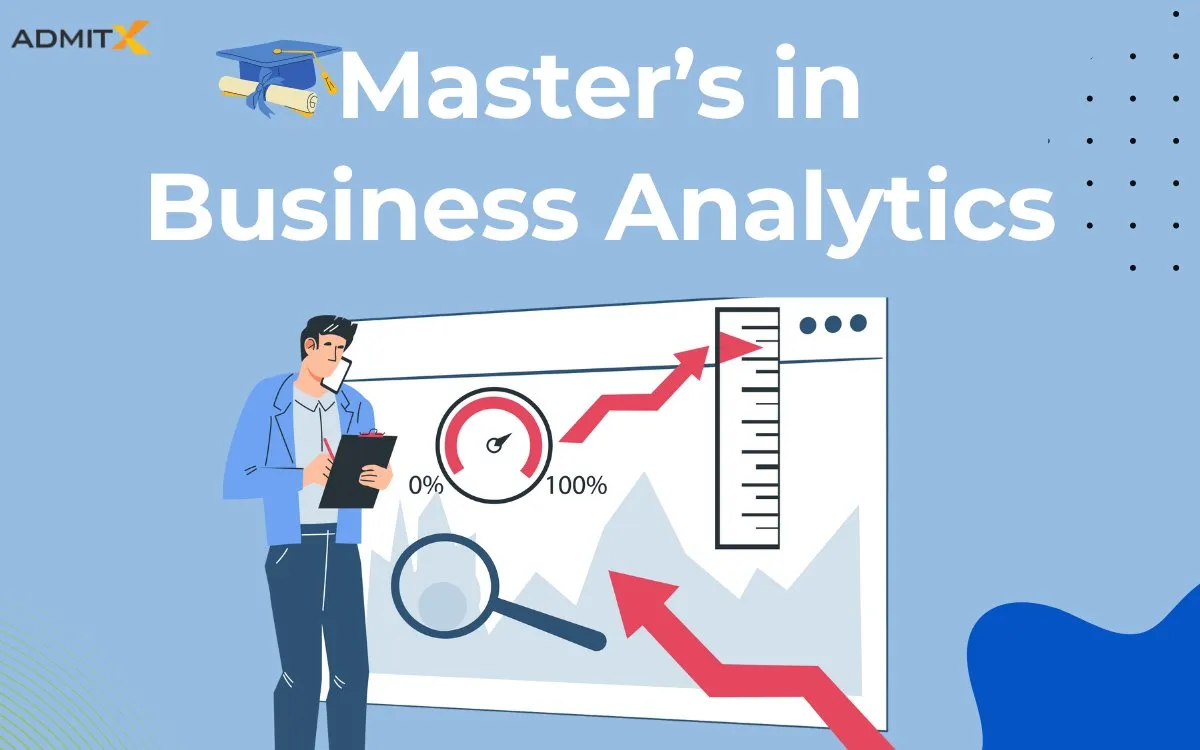
Master’s in Business Analytics: Top Universities, Syllabus and Jobs
This guide will help you learn about master’s in business analytics courses. We will explain what are master’s in business analytics programmes. Whether you have just finished university or have work experience, this guide will help you make the right choices. You will find out about the best courses, how much you might earn, and what jobs are available.
- What is Business Analytics, and Why Pursue It?
- Top Universities for Master’s in Business Analytics Course
- Master’s in Business Analytics Course Content
- Career Options After Master’s in Business Analytics
- Admission Requirements for International Students in Masters of Business Analytics
- Admissions Process for a Master's in Business Analytics
- Conclusion
- FAQs
What is Business Analytics, and Why Pursue It?
Business analytics has become an essential component of contemporary business operations. It involves systematically examining data through statistical methods to inform strategic decision-making.
By identifying patterns and trends within large datasets, organisations can gain valuable insights to optimise performance, reduce costs, and increase revenue. Here are some good reasons to pursue a master’s in business analytics:
- High Demand for Graduates: Organisations across various sectors increasingly rely on data-driven decision-making. As a result, there is a strong demand for skilled business analysts. An MSc in business analytics can significantly enhance your job prospects and career advancement opportunities.
- Excellent Return on Investment (ROI): Graduates with a Master’s in Business Analytics often enjoy higher salaries than those with undergraduate degrees. Employers across finance, healthcare, technology, and marketing industries highly value the specialised skills and knowledge acquired during the programme.
- Development of Essential Skills: A Master’s in Business Analytics equips you with advanced data analysis, statistical modelling, data visualisation, and machine learning competencies. These skills are crucial for success in today’s data-driven business environment.
- Career Progression and Leadership Opportunities: You can progress by deeply understanding business analytics. A Master’s degree can open doors to leadership positions where you can apply your analytical skills to make strategic decisions.
Top Universities for Master’s in Business Analytics Course
Several universities offer master’s in business analytics courses. These universities are unique because they have excellent teachers, amazing places to do research, lots of connections with businesses, and many successful alumni. Here is a list of universities:
| University | Course | Ranking | Duration | Tuition Fees (Total Fees) |
|---|---|---|---|---|
| UCLA | Master of Business Analytics | 1 | 15 months | $75,445 |
| MIT (Sloan) | Master of Business Analytics | 2 | 12 months | $91,250 |
| ESSEC | Master in Data Sciences & Business Analytics | 3 | 2 years | €43,000 |
| HEC Paris | Master of Science and Technology in Data Science for Business | 3 | 2 years | €52,000 |
| Duke University | Master of Quantitative Management: Business Analytics | 5 | 19 months | $83,500 |
| Imperial College Business School | MSc Business Analytics | 6 | 1 year | £41,000 |
| ESCP Business School | MSc in Big Data & Business Analytics | 7 | 15 months | €24,000 |
| IE Business School | Master in Business Analytics and Big Data | 8 | 11-17 months | €41,000 |
| Texas (McCombs) | Master of Science in Business Analytics | 9 | 10 months | $53,000 |
| NUS Business School | Master of Science (Business Analytics) | 10 | 13 months | SGD 70,850 |
Master’s in Business Analytics Course Content
The Master’s in Business Analytics is designed for students with a quantitative background, such as engineers, mathematicians, computer programmers, statisticians, and physicists. The programme is suitable for those seeking career advancement or a change in direction.
Course Duration
The typical duration of a Master’s in Business Analytics programme is 12 to 14 months, although this can vary depending on the university and country.
Course Structure
The specific courses offered within a Master’s in Business Analytics program can differ between universities. However, the common syllabus for master’s in business analytics includes:
- Business Statistics
- Data analysis
- Predictive modelling
- Programming for analytics
- Supply chain analytics
- Energy analytics
Specialisations
Many Master’s in Business Analytics programmes offer specialisations for students to focus on specific areas of interest. Popular specialisations include:
- Customer analytics
- Operations Analytics
- People analytics
- Accounting Analytics
Essential Skills
To succeed in business analytics, students need technical and soft skills.
- Technical and analytical skills are essential for analysing data and solving business problems.
- Communication and interpersonal skills are vital for effectively collaborating with colleagues and stakeholders.
- Programming skills are necessary for working with data and building analytical models.
Career Options After Master’s in Business Analytics
A master’s in Business Analytics opens up many career paths. Here are some of the most common roles:
Data Analyst: Data analysts collect, process, and analyse data to inform business decisions. They use their technical skills to ensure data accuracy and present findings effectively. Key skills include:
- Programming languages (R, SAS)
- Analytical and creative thinking
- Data visualisation
- Communication
- Database querying languages (SQL)
- Data mining, cleaning, and munging
- Machine learning
- Advanced Microsoft Excel
Supply Chain Analyst: Supply chain analysts optimise operational performance by identifying project requirements, coordinating with team members, and recommending process improvements. They work closely with engineers and quality assurance professionals.
Big Data Analyst: Big data analysts study and analyse large datasets to identify patterns and trends that inform business decisions. Strong problem-solving, critical thinking, and creativity are essential for this role. Technical skills include:
- Programming (e.g., MapReduce, Hadoop, Hive, Apache Spark)
- Quantitative analysis
- Data interpretation
- Data mining and auditing
Business Analyst: Business analysts bridge the gap between business needs and IT solutions. They identify and analyse requirements, document processes, and facilitate communication among stakeholders. Key skills include:
- Statistical analysis software (R, SAS, SPSS, STATA)
- Business intelligence
- Python and R
- Survey/query software
- Database design
- Data mining
- SQL
- Data visualisation
Predictive Modeller: Predictive modellers create programs that make predictions based on data. They require strong statistical, analytical, and technological skills. They need to be very good at:
- Understanding data
- Using statistics
- Programming skills
- Problem-solving
Technical Team Lead: Technical team leads manage and lead technical teams. They need a combination of technical expertise, leadership, and management skills.They need a mix of skills:
- Technical knowledge
- Leadership skills
- People management
- Project management
- Communication skills
Here is a list of jobs and salaries after pursuing a master’s in business analytics:
| Jobs | Salaries |
|---|---|
| Data Analyst | $68000-$100000 (INR 56-82 Lakhs) |
| Supply Chain Analyst | $69000-$99000 (INR 57-82 Lakhs) |
| Big Data Analyst | $77000-$100000 (INR 64-82 Lakhs) |
| Business Analyst | $70000-$100000 (INR 58-82 Lakhs) |
| Predictive Modeller | $74000-$100000 (INR 61-82 Lakhs) |
| Technical Team Lead | $100000-$200000 (INR 82 Lakhs-1 cr) |
| Data Engineer | $88000-$100000 (INR 73-82 Lakhs) |
| Corporate Strategy Analyst | $84000-$200000 (INR 70-82 Lakhs) |
| Operation Analyst | $64000-$100000 (INR 53-82 Lakhs) |
| Data Scientist | $91000-$100000 (INR 76-82 Lakhs) |
Country-Wise Average Salary
Several factors contribute to the salary of a Business Analytics professional. Educational background is the first and most important factor, with graduates from prestigious institutions often having higher salaries. Master’s degrees can further enhance earning potential. The average salary of a business analyst in the USA is around $70,000-$100,000.
Additionally, geographical location significantly impacts the salary, as cities with high demand for these skills tend to offer more lucrative positions. For example: Berlin and Munich are among the top cities with good demand for business analytics professionals as compared to the other cities in Germany. Finally, an individual’s experience level directly correlates with their salary, with more experienced professionals earning more. Here is a list of average salaries in countries for a master’s in business analyst degree:
| Countries | Average Salaries (Annually) |
|---|---|
| USA | $70,000-$100,000 |
| UK | £32000 - £54000 |
| France | €40000 - €52000 |
| Germany | €50000 - €66000 |
| Singapore | SGD 50000 - SGD 70000 |
| Ireland | €40000 - €60000 |
| Canada | CA$58,000 - CA$82,000 |
| Australia | A$90000 - A$100000 |
| New Zealand | NZ$80000- NZ$100000 |
Also read – Ways to Fund your Overseas Education
Admission Requirements for International Students in Masters of Business Analytics
International students aspiring to pursue a Masters in Business Analytics at top universities should carefully consider the following critical admission criteria:
Academic Qualifications
Applicants must have a 16-year education and should have completed an undergraduate program.
English Language Proficiency
- Standardised Tests: Showcase English language proficiency is essential. Scores from IELTS, TOEFL, or PTE exams are commonly accepted.
- Score Requirements: While specific score vary among institutions, average expectations are:
- IELTS: 7.0-7.5
- TOEFL iBT: 90-100
- PTE: 50-60
Standardised Tests
- GRE or GMAT: Depending on the applicant’s undergraduate field (science/engineering vs. business), either GRE or GMAT scores may be required. Average target scores are:
- GRE: 310+
- GMAT: 641+
- GMAT Focus: 720
Work Experience
While not mandatory, some universities prefer candidates with 2-5 years of professional experience.
Student Visa
A valid study visa for the intended country is required. Students should initiate the visa application process approximately three months before departure.
Admissions Process for a Master’s in Business Analytics
Securing a place in a Master’s in Business Analytics program involves several key steps:
Research and Application
- Identify Universities: Research institutions renowned for their business analytics programs.
- Gather Information: Visit the official websites of your chosen universities to obtain specific admission requirements, deadlines, and application procedures.
- Prepare Documentation: Collect essential documents such as academic transcripts, standardised test scores (GRE/GMAT, IELTS/TOEFL), letters of recommendation, and a curriculum vitae.
- Complete the Application: Carefully complete the application form, providing accurate and comprehensive information. Pay any required application fees.
Evaluation and Selection
- Submission: Submit your completed application along with the necessary supporting documents.
- Review: The university’s admissions committee assesses your application based on academic qualifications, work experience, test scores, and other relevant criteria.
- Interviews: Some programs may require shortlisted candidates to participate in interviews as part of the selection process.
Acceptance and Enrollment
- Admission Offer: Successful applicants receive an offer of admission from the university.
- Enrollment: Upon accepting the offer, students pay a deposit to secure their place in the program.
- Visa: International students should initiate the visa application process according to the requirements of their chosen country.
Conclusion
Master’s in business analytics opens doors to vast opportunities which is why it has become the most sought-after programme for international students to pursue. However, selecting the right university is crucial to obtaining a degree from a recognised university. This degree ultimately helps you to get a high-paying job, so get your documents prepared to not face difficulties in the end moment.
FAQs
Who should do an MS in Business Analytics?
An MS in Business Analytics is ideal for individuals with a quantitative background, such as those with degrees in mathematics, statistics, engineering, or computer science, who want to change into a business-focused role. It’s also suitable for professionals in business roles seeking to enhance their data analysis and decision-making skills.
How good is a Master's in Business Analytics for your career?
A Master’s in Business Analytics is highly beneficial for your career. It equips you with the skills to extract valuable insights from data. Graduates often find employment in roles like data analyst, business analyst, data scientist, or market research analyst, with opportunities across various industries. The high demand for these skills leads to excellent career prospects and competitive salaries.
Which is better, an MBA in Business Analytics or an MSc in Business Analytics?
The primary difference between an MBA in Business Analytics and an MSc in Business Analytics lies in their focus. An MBA offers a broader business perspective, covering areas like finance, marketing, strategy, and business analytics. On the other hand, an MSc talks about the technical aspects of data analysis, statistical modelling, and machine learning.
What skills and knowledge can I gain from a Master's in Business Analytics?
A Master’s in Business Analytics will equip you with a strong foundation in statistical methods, data mining, and predictive modelling. You will learn how to collect, clean, and analyse large datasets.
What career paths are open to graduates of a Master's in Business Analytics?
Graduates of a Master’s in Business Analytics possess a versatile skill set that opens doors to various career paths. Many find employment as data analysts, business analysts, or data scientists within multiple industries such as finance, marketing, healthcare, and consulting.
If you are an aspirant looking to study at your dream university, book an appointment with AdmitX today and start your applications early to avail yourself of all the benefits.








